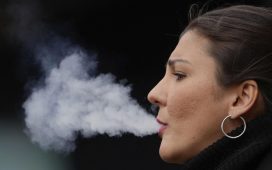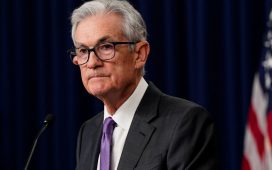Cruise ships are preparing to set sail once again after more than a year in port due to coronavirus restrictions.
Sunday will mark the first cruise out of the U.S. with paying passengers since March 2020. Major cruise lines such as Royal Caribbean International, Norwegian Cruise Line and Carnival Cruise Line have scheduled voyages for July and August.
The industry suffered huge losses last year as its ships sat empty. But cruise lines are getting some good news: Demand is high, and COVID-19 restrictions may be coming to an end.
A federal judge on Friday ruled that the Centers for Disease Control and Prevention (CDC) cannot enforce its conditional sail order that imposes COVID-19 restrictions on cruise lines. The CDC rules will stay in effect until July 18, at which point they will become nonbinding recommendations.
Florida Gov. Ron DeSantis
“The restrictions targeting cruising have been uniquely specific, even as most of the rest of the economy has been allowed to reopen,” said Tori Emerson Barnes, executive vice president for public affairs and policy at the U.S. Travel Association.
“One of the lessons of the pandemic should be that restrictions should be clear, consistent, and science-based,” Barnes said. “Viewed through that lens, the conditional sail order against cruising should have been long since lifted, and we should be moving immediately toward a broader reopening of international travel.”
The CDC has until July 2 to revise its restrictions. The industry is pushing the CDC to ease its rules even sooner, arguing that cruise lines need to catch the all-important summer season. Cruise lines are making the case that they have worked with public health experts and governments around the world to develop standards that ensure their ships are safe.
“With nearly 600,000 passengers having sailed with these new measures in place, we are pleased to say that they are working as intended to mitigate risk while still offering vacationers unforgettable experiences,” Laziza Lambert, director of strategic communications and public affairs at the Cruise Lines International Association, said in a statement.
While DeSantis celebrated Friday’s ruling, his own policies have caused confusion for cruise lines that frequently embark from Florida ports. In April, DeSantis issued an executive order prohibiting businesses from requiring customers to provide proof of COVID-19 vaccination. Last month, DeSantis signed a bill codifying the “vaccine passport” ban effective July 1.
That policy contradicts CDC rules, which require cruise ships to verify that 95 percent of passengers and 98 percent of crew members are fully vaccinated.
Cruise line executives have been lobbying DeSantis to craft an exemption for cruises. But DeSantis’s office has insisted that no such measure is in the works and said the CDC is to blame for requiring proof of vaccination.
Florida’s rules have caused a split within the industry, with some companies continuing to verify vaccinations and others dropping the requirement.
Norwegian Cruise Line said this month it will require all crew members and passengers to be fully vaccinated. CEO Frank Del Rio previously threatened to move the company’s ships out of Florida if it is forced to comply with DeSantis’s ban.
Carnival, the world’s largest cruise line, recently told customers it will require proof of vaccination. A small number of unvaccinated passengers will be allowed in accordance with CDC rules.
“Our focus remains on the health and safety of our guests, crew and the communities we serve and visit,” Christine Duffy, president of Carnival, said in a statement this month.
Celebrity Cruises, which will embark Sunday from Fort Lauderdale, has been asking whether booked passengers are vaccinated, rather than requiring proof, as a way to circumvent Florida’s rules.
Royal Caribbean, which owns Celebrity Cruises, had required passengers to show proof of vaccination but reversed course earlier this month. The cruise line instead embarked on a two-day test voyage from Miami this past weekend with 600 volunteer passengers, many of whom are company employees.
CDC rules state that cruise ships that don’t meet vaccination standards must first conduct a successful test cruise before welcoming back paying passengers.
The agency relaxed its guidelines last week. It previously warned all Americans to avoid cruises; now it states that only vaccinated people should travel.
The cruise industry was one of the hardest hit by the pandemic. Governments around the world swiftly shut down cruises after high-profile COVID-19 outbreaks, and most ships still sit empty as governments slowly lift restrictions.
In 2020 alone, Carnival and Royal Caribbean posted losses of $10.2 billion and $5.8 billion, respectively. The Cruise Lines International Association estimated that the pandemic’s damage cost 518,000 industry jobs.
At the outset of the pandemic, cruise lines hired lobbyists with close ties to House Speaker Nancy (D-Calif.), House Minority Leader Kevin McCarthy

Lawmakers ultimately didn’t provide direct aid to cruise lines in any of their COVID-19 stimulus packages that clocked in at trillions of dollars by the end. The industry grumbled as Congress gave tens of billions to airlines that were also forced to shut down amid the pandemic.
Still, cruise lines expect to make up for some of those losses with an influx of bookings later this year and in 2022. They expect demand will outstrip supply as Americans who couldn’t leave the country last year seek out international travel.
“As we continue to work towards resuming operations around the world, and the demand for cruises remaining high, we expect to see the passenger numbers and the growth trajectory rebound to pre-pandemic numbers in the coming year,” Lambert said.






